
Journal of Flow Chemistry
metrics 2024
Shaping the Future of Chemical Processes
Introduction
Welcome to the Journal of Flow Chemistry, a premier academic journal published by Springer, dedicated to the innovative domain of flow chemistry. With an ISSN of 2062-249X and e-ISSN 2063-0212, this journal serves as a vibrant platform for researchers, professionals, and students interested in advancing the understanding of fluid flow and transfer processes, organic chemistry, and associated methodologies. Since its inception in 2011, the journal has established itself in reputable quartiles, ranking Q2 in Chemistry (miscellaneous), Fluid Flow and Transfer Processes, and Organic Chemistry as of 2023, with Scopus ranks showcasing its influential role within the community. With a commitment to open access, the Journal of Flow Chemistry enables broader dissemination of cutting-edge research from Hungary, contributing significantly to the global discourse in chemical engineering. Researchers are encouraged to submit original research articles, reviews, and impactful studies that drive innovation and application in flow chemistry.
Metrics 2024
 0.48
0.48 2.00
2.00 2.30
2.30 32
32Metrics History
Rank 2024
Scopus
IF (Web Of Science)
JCI (Web Of Science)
Quartile History
Similar Journals
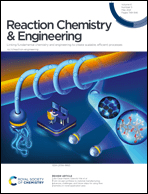
Reaction Chemistry & Engineering
Driving Progress in Catalysis and BeyondReaction Chemistry & Engineering is an esteemed journal published by the Royal Society of Chemistry, dedicated to advancing the field of chemical engineering. With a focus on pivotal topics including catalysis, process technology, and fluid flow, this journal serves as a critical platform for researchers and professionals seeking to disseminate innovative findings and methodologies. As of 2023, it boasts impressive impact factors, ranking Q2 in Catalysis and consistently appearing in the Q1 categories for several related fields, thus recognizing its influence and relevance in the scientific community. With Scopus rankings placing it among the top 30 journals in multiple chemical engineering categories, Reaction Chemistry & Engineering encourages open dialogue and collaboration among scientists aiming to overcome contemporary challenges in chemical processes. This journal is vital for anyone involved in the development and application of chemical engineering, providing essential insights and fostering progress in this dynamic discipline. Explore the latest research and contribute to future innovations by engaging with the cutting-edge work presented in Reaction Chemistry & Engineering.
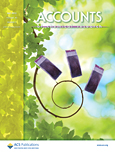
ACCOUNTS OF CHEMICAL RESEARCH
Elevating the Standards of Chemical Research and ApplicationACCOUNTS OF CHEMICAL RESEARCH, published by the American Chemical Society, is a premier journal dedicated to advancing the field of chemistry and its applications in medicine. With an impressive impact factor and recognition as a Q1 journal in both chemistry and medicine categories, it ranks among the top-tier publications, exhibiting an outstanding Scopus rank of 8 out of 408 in general chemistry, placing it in the 98th percentile. This journal has been a vital source of innovative and significant research since its inception in 1968, and it aims to provide a platform for high-quality research articles, reviews, and critical essays that bridge the gap between chemical research and clinical implications. While it is not an open-access publication, the insights available in Accounts of Chemical Research are invaluable for researchers, professionals, and students seeking to explore the latest developments and interdisciplinary approaches within the dynamic fields of chemistry and medicine.
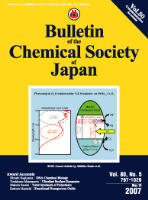
BULLETIN OF THE CHEMICAL SOCIETY OF JAPAN
Catalyzing Progress: Connecting Ideas in ChemistryBULLETIN OF THE CHEMICAL SOCIETY OF JAPAN, published by the esteemed Chemical Society of Japan, serves as a pivotal platform for the dissemination of cutting-edge research in the multifaceted field of chemistry. With an ISSN of 0009-2673 and an E-ISSN of 1348-0634, this journal has been integral in fostering the growth of chemical sciences globally since its inception in 1965. The journal holds an impressive Q2 ranking in the Chemistry (miscellaneous) category, indicating its relevance and influence within the academic community, as reflected by its Scopus rank of #104/408, placing it in the 74th percentile. Although it is not an open-access journal, its rich content, which spans a wide range of topics in general chemistry, remains highly valued by researchers, professionals, and students alike, affirming its crucial role in advancing both theoretical knowledge and practical applications in chemistry. As it converges towards 2024, the bulletin continues to uphold its commitment to excellence in scientific communication and research dissemination in Japan and beyond.

RUSSIAN CHEMICAL BULLETIN
Advancing the Frontiers of Chemistry.RUSSIAN CHEMICAL BULLETIN, published by SPRINGER, serves as a pivotal resource in the field of general chemistry, covering a wide array of topics that impact both theoretical and applied chemistry. With an ISSN of 1066-5285 and a presence since 1993, this journal provides a platform for disseminating significant research findings, practical applications, and novel methodologies within the broader chemistry community. While it currently holds a Q3 ranking in the Chemistry (miscellaneous) category and occupies the 230th position out of 408 in the Scopus rankings, its reputation continues to grow, fostering collaboration and innovation among researchers and professionals alike. Although the journal does not offer an open-access model, it is committed to making findings accessible within the academic community, ensuring that valuable insights can inform future research. With an anticipated convergence of studies extending to 2024, the RUSSIAN CHEMICAL BULLETIN remains an essential reference for those dedicated to advancing chemical science.
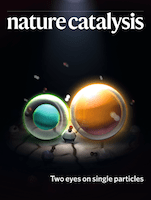
Nature Catalysis
Pioneering Research at the Intersection of Science and EngineeringNature Catalysis is a premier academic journal published by NATURE PORTFOLIO, specializing in the rapidly evolving fields of biochemistry, bioengineering, and catalysis. With its ISSN of 2520-1158, this journal has emerged as an invaluable resource since its inception in 2018, contributing significantly to interdisciplinary research. Recognized for its high impact within the scientific community, it holds a prestigious Q1 ranking across multiple categories, including Biochemistry, Process Chemistry and Technology, and Catalysis as of 2023, illustrating its influence and authority in the field. Researchers will find impactful articles characterized by rigorous peer review processes that push the boundaries of knowledge in catalysis and its applications. While the journal operates with traditional access models, it remains accessible to a global audience interested in innovative research findings that promise to shape future developments in these critical areas. Positioned at the forefront of contemporary scientific inquiry, Nature Catalysis invites contributions that expand upon catalytic processes and technologies, which are crucial for advancing both fundamental science and applied engineering.
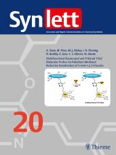
SYNLETT
Empowering Researchers with Cutting-Edge InsightsSYNLETT is a prominent academic journal dedicated to the field of Organic Chemistry, published by GEORG THIEME VERLAG KG. Since its inception in 1989, the journal has played a critical role in advancing the understanding of synthetic methodologies and organic compounds, offering a platform for innovative research and discoveries. With an ISSN of 0936-5214 and an E-ISSN of 1437-2096, SYNLETT is well-regarded in the academic community, presently positioned in the Q3 quartile for Organic Chemistry according to the 2023 category rankings. The journal is particularly valuable for researchers and professionals seeking insights into contemporary organic synthesis methods and their applications. Although it does not operate under an Open Access model, it remains a crucial resource within the field, contributing to significant advancements and collaborations globally. For those engaged in organic synthesis, SYNLETT not only encapsulates cutting-edge research but also inspires innovation in the discipline.
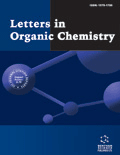
LETTERS IN ORGANIC CHEMISTRY
Shaping the Future of Organic Chemistry ResearchLETTERS IN ORGANIC CHEMISTRY is a distinguished journal published by Bentham Science Publishers Ltd, focusing on the rapidly evolving field of organic chemistry. Established in 2005, the journal commits itself to disseminating vital research findings, reviews, and innovative methodologies that contribute to the understanding and advancement of organic chemistry and biochemistry. With an ISSN of 1570-1786 and an E-ISSN of 1875-6255, this journal enhances accessibility and visibility for authors and readers alike, albeit not adopting an open-access model. Positioned within Q4 quartile rankings for both Biochemistry and Organic Chemistry, it serves a niche audience keen on exploring emerging trends and breakthroughs in these disciplines. Its Scopus rankings further reflect its role in the global academic landscape, albeit at the beginning stages of its impact journey. Based in the United Arab Emirates, LETTERS IN ORGANIC CHEMISTRY is dedicated to fostering dialogue among researchers and practitioners, paving the way for future innovations in organic and biochemical sciences.
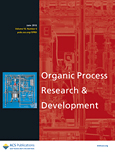
ORGANIC PROCESS RESEARCH & DEVELOPMENT
Exploring New Horizons in Organic Synthesis and EngineeringORGANIC PROCESS RESEARCH & DEVELOPMENT, published by the American Chemical Society, is a premier journal dedicated to advancing the field of organic chemistry and its applications in process research and development. Since its inception in 1997, the journal has established itself as a leading source of innovative research, receiving a prestigious Q1 ranking in both Organic Chemistry and Physical and Theoretical Chemistry as of 2023. This esteemed publication, accessible in print and online formats, caters to a wide range of topics including synthetic methodologies, reaction engineering, and the integration of green chemistry principles. With a commitment to excellence, it aims to disseminate high-quality research that not only contributes to academic knowledge but also addresses real-world challenges in the chemical industry. The journal's significant impact is reflected in its Scopus ranking, where it holds an impressive position in the 75th percentile among its peers. Researchers, professionals, and students in the field are encouraged to explore and contribute to this influential platform, which plays a vital role in shaping the future of organic process development.
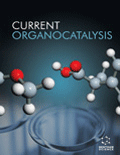
Current Organocatalysis
Exploring New Horizons in CatalysisCurrent Organocatalysis is a premier academic journal dedicated to the dynamic field of organocatalysis, published by Bentham Science Publishers, Ltd. Based in the United Arab Emirates, this journal has been a valuable resource for researchers since its inception in 2014 and will continue to publish impactful articles until 2024. The journal provides a platform for sharing groundbreaking research, reviews, and insights that significantly contribute to the fields of Analytical Chemistry, Catalysis, and Organic Chemistry. With a Q4 ranking in several chemistry categories, it identifies and disseminates emerging strategies and methodologies in organocatalysis, promoting collaboration and advancement in the community. While it operates on a subscription basis, the journal ensures accessible content for its audience to further supplement academic learning and professional development. Researchers, professionals, and students are encouraged to explore and contribute to this critical field, leveraging the journal as an essential resource for the latest trends and innovations in organocatalysis.

ChemistryMethods
Exploring New Frontiers in Chemical MethodologiesChemistry Methods, published by WILEY, is an esteemed journal in the field of chemical sciences that serves as a vital platform for disseminating cutting-edge research and methodologies across various domains of chemistry. With a focus on practical approaches in areas such as fluid flow and transfer processes, spectroscopy, electrochemistry, and catalysis, this journal has achieved impressive ranks in Scopus—including a notable 15th position in both fluid flow and spectroscopy categories, which reflects its significant contribution to advancing the discipline. Although Chemistry Methods operates under a traditional access model, it remains crucial for researchers, professionals, and students who are eager to engage with high-quality original research and reviews. Since its inception in 2021, the journal's objective has been to bridge the gap between theoretical knowledge and practical application in chemistry, fostering innovation and collaboration within the global scientific community.